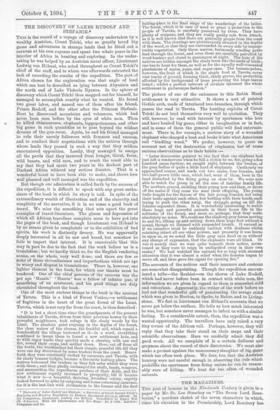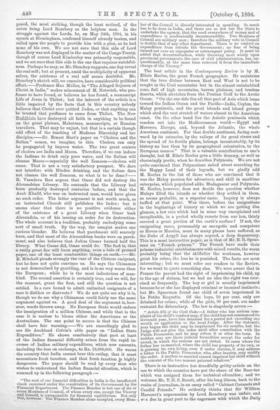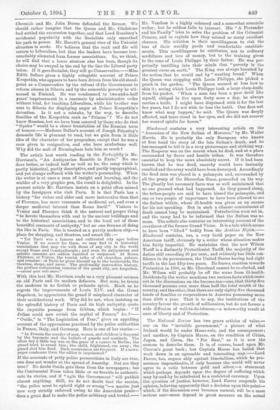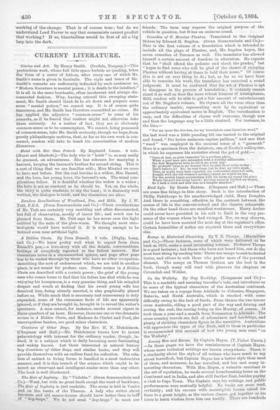THE MAGAZINES.
Teem post of honour in the Nineteenth Century is given to a paper by Mr. St. Loe Strachey on "The Seven Lord Rose. bevies," a mordant sketch of the seven characters in which, since his elevation to the Premiership, Lord Rosebery has
posed, the most striking, though the least noticed, of the seven being Lord Rosebery as the helpless man. In the struggle against the Lords, he, on May 24th, 1894, in his speech at Birmingham, confessed himself already beaten, and called upon the people to provide him with a plan, as he had none of his own. We are not sure that this side of Lord Rosebery was not displayed in the matter of the Congo Treaty, though of course Lord Kimberley was primarily responsible, and we are sure that this side is the one that requires watchful- ness. Perhaps he may, as Mr. Strachey suggests, one day reveal the real self ; but at present, amid the multiplicity of apparent selves, the existence of a real self seems doubtful. Mr. Strachey's sketch will, we conceive, have considerable political effect.—Professor Max Muller, in "The Alleged Sojourn of Christ in India," makes mincemeat of M. Notovich, who pro- fesses to have found, or believes he has found, a manuscript Life of Jesus in Thibet ; but the interest of the article is a little impaired by the facts that in this country nobody believes that Christ ever quitted Judea, or that anything can be trusted that professes to come from Thibet. The New
Buddhists have destroyed all faith in anything to be found on the great plateau, Mahatmas, manuscripts, or Russian travellers. That may be unjust, but that is a certain though -odd effect of the teaching of Madame Bla.vatsky and her disciples.—Dr. Ernest Hart's paper on " Cholera and the Sultan" comes, we imagine, to this. Cholera can only be propagated by impure water. The two great centres of cholera are India and Mecca. Therefore, if we can induce the Indians to drink only pure water, and the Sultan will -cleanse Mecca—especially the well Zemzem—cholera will
cease. That is not a very satisfactory prospect. We dare not interfere with Hindoo drinking, and the Sultan dare not cleanse the well Zemzem, so what is to be done P— .R. Vasudeva Rau argues that Omar did not destroy the Alexandrian Library. He contends that the Library had been gradually destroyed centuries before, and that the Arab Khalif, who was an instructed man, would have given no such order. The latter argument is not worth much, as an instructed Church still publishes the Index; but it seems clear that there is no positive evidence either of the existence of a great Library when Omar took Alexandria, or of his issuing an order for its destruction. The whole account is a tradition, probably embodying some sort of small truth. By the way, the essayist makes one curious blunder. He believes that parchment will scarcely burn, and that most of the Alexandrian books were on parch- ment, and also believes that Julius Caesar burned half the library. What Caesar did, Omar could do. The fact is, that a really great fire will barn anything, even a bale of pressed paper, one of the least combustible things on earth.—Mr. E. Mitchell pleads strongly the case of the Chinese emigrant, but he does not quite convince us. He says the Chinaman is not demoralised by gambling, and is in no way worse than the European ; while he is the most industrious of man- kind. The second assertion is certainly true, and we will, for the moment, grant the first, and still the question is not settled. Is a race bound to admit unlimited emigrants of a race it dislikes or distrusts P We do not quite see why it is, though we do see why a Chinaman could fairly use the same argument against us. A good deal of the argument is, how- ever, words thrown away. No European State would endure the immigration of a million Chinese, and while that is the case it is useless to blame either the Americans or the Australians. The one point to secure is that the Chinese shall have fair warning.—We are exceedingly glad to see Sir Auckland Colvin's able paper on "Indian State Expenditure." He shows conclusively that part at least -of the Indian financial difficulty arises from the rapid in- crease of Indian military expenditure, which now amounts, including the loss on exchange, to Rx. 24,000,000. He warns the country that India cannot bear this outlay, that it must necessitate fresh taxation, and that fresh taxation is highly dangerous. The paper should be read by every man who wishes to understand the Indian financial situation, which is summed up in the following paragraph :—
" The root of our financial difficulties in India is the insufficient check exercised under the constitution of its Government by the financial Department. The Finance Member is but one of six or seven Members of Council, of whom every one, except the Viceroy and himself, is irresponsible for financial equilibrium. Not only this, however. The Finance Member alone excepted, every Mem-
ber of the Council is directly interested in spending. So much has to be done in India, and there are so few but the State to undertake the agency, that the need everywhere of money and of expenditure is academically incontrovertible. Two Members of Council are military men ; therefore the military vote in Council is double that of any other department. There is no control on expenditure from outside the Government; no fear of being turned out over an unpopular or extravagant policy. It must be added that decentralisation, while throwing most wisely upon provincial governments the care of civil administration, has, un- questionably, at the same time removed it from the immediate charge of the Viceroy."
The best article in the Contemporary Review is by M. Elisee Reclus, the great French geographer. He maintains
that the true divisor between East and West is not to be sought in the Ural mountains but in the almost uninhabited zone, full of high mountains, barren plateaus, and treeless deserts, which stretches from the Persian Gulf to the Arctic
Ocean. " On the one side lies all that part of Asia which leans toward the Indian Ocean and the Pacific—India, Ceylon, the Malay peninsula, and the great islands and island groups which stud the vast stretch of waters almost to the American coast. On the other hand lies the Asiatic peninsula which reaches out into the Mediterranean world—Egypt and Morocco, Europe, and, beyond the Atlantic, the whole American continent. For that double continent, facing east- ward by its estuaries, by the valleys of its great rivers and the spread of its fertile plains, belongs incontestably, by its history no less than by its geographical orientation, to the European cosmos." That is a valuable contribution to one's thought, but M. Elisee Reclus gets a little dreamy, as well as
charmingly poetic, when he describes Polynesia. We are not quite convinced that Polynesians sailed about searching for the Happy Land of their legends, but we gladly add M. Reclus to the list of those who are convinced that it was the Malay passion for adventure, and skill in maritime
enterprise, which populated alike Madagascar and Polynesia. M. Reclus, however, does not decide the question whether Malays filled the islands or whether they settled in them, as seems probable, as a superior caste. Inquiry is always baffled at that point. Was there, before the emigrations in the beginnings of history at which we are getting dim glances, a low race which had in some way unexplained and inexplicable, in a period wholly remote from our ken, thinly covered a great portion of the earth's surface ? If not, the emigrating races, presumably as energetic and competent
as Hovas or Maories, must in many places have suffered, as the Duke of Argyll has always argued, a deep degeneracy. This is a most instructive paper, as is that of Mr. E. R. Spear- man on " French prisons." The French have made their prisons industrial establishments with mixed results, the worst probably being that the skilfuller the workman, however great his crime, the less he is punished. The facts are most interesting ; but we must refer our readers to the Review, for we want to quote something else. We were aware that in France the parent had the right of imprisoning his child, up to the age of sixteen, but we had no idea the right was exer- cised so frequently. The boy or girl is usually imprisoned because he or she has displayed criminal or immoral instincts; but Mr. Spearman found one child of seven imprisoned in La Petite Roquette. Of the boys, 20 per cent. only are detained for crime ; while of the girls, 99 per cent, are under restraint for debauchery. The law is singularly severe :— "Article 375 of the Civil Cocle.—A. father who has serious com- plaint of his child's conduct may, if the child has not commenced its sixteenth year, have him detained for a period not exceeding one month on application to the local Judge. After the sixteenth year begun the child may be imprisoned for six months, but the Judge will not give the order until after consultation with the Public Prosecutor, and he may refuse it or alter the term. In neither case are there judicial formalities except the order for arrest, in which the reasons are not stated. In cases where the father has re-married, where the child has property of its own, or is gaining its own living, even if under sixteen, it may address a letter to the Public Prosecutor, who, after inquiry, may modify the order. A mother re-married cannot imprison her child without the consent of the two nearest paternal relatives."
There is an instructive but dreadfully gritty article on the use to which the counties have put the share of the Beer-tax which was assigned them for technical education; and we welcome Mr. T. H. S. Escott, after his long illness, back to the realm of journalism, in an essay called " Cabinet Counsels and Candid Friends." He evidently thinks that Sir William Harcourt's supersession by Lord Rosebery was unfair, and vv.-A due in great part to the eagerness with which the Daily
Chronicle and Mr. John Burns defended the former. We should rather imagine that the Queen and Mr. Gladstone had settled the succession together, and that Lord Rosebery's accidental popularity with the Socialists only smoothed his path to power. Mr. Escott's general view of the Unionist situation is acute. He believes that the rank and file will return to Liberalism, but that the leaders have become irre- concilably alienated from former associations. So, we think, he will find that a lower stratum also has been, though its choice may be swayed in the end by the line the Liberal party takes. If it goes Socialist, they will go Conservative.—Miss Edith Sellers gives a highly eulogistic account of Prince Kropotkin, who appears to have been driven from his old stand- point as a Conservative by the refusal of the Government to reform abuses in Siberia and by the miserable poverty he wit- nessed in Finland. He was condemned to two-and-a-half years' imprisonment in a casemate by administrative order without trial, for teaching Liberalism, while his brother was
sent to Siberia for displaying anger at Prince Kropotkin's detention. Is it not a mistake, by the way, to describe families of the Kropotkin rank as " Princes " P We do not know Russian, but we have been assured by those who do that " Squire " would be a closer translation of the Russian term of honour.—Madame Belloo's account of Joseph Priestley's domestic life is pleasant to read, but we gain from it little idea of the character of her progenitor, except that he was a
man given to resignation, and who bore misfortune well. Why did the mob of Birmingham hate him so much P The article best worth reading in the Fortnightly is Mr.
Harrison's, "An Antiquarian Ramble in Paris." No one does better, or indeed half so well as he, the essay which is partly historical, partly descriptive, and partly topographical, and yet always suffused with the writer's personality. When the writer is at once a man of insight and learning, and the wielder of a very graphic pen, the result is delightful. In the present article Mr. Hanison insists on a point often missed by the foreigners who visit Paris. It is that Paris has a history "far richer and older and more instructive than that of Florence, has more remnants of mediaeval art, and even a deeper mediaeval interest than Rome itself." Visitors to Venice and Florence think it the natural and proper thing "to devote themselves with zeal to the ancient buildings and to the historical associations, and to the local art of these beautiful remnants of antiquity," but no one dreams of doing the like in Paris. She is treated as a purely modern city,—a place for shopping, and theatres, and smart life :
" Yet Paris was a famous and cultivated city ages before Venice. If we search for them, we may find in it historical associations that may vie with those of any city in the world except Rome and Constantinople ; and even its antiquarian and artistic remains are seldom equalled or surpassed. At Rome, Florence, or Venice, the tourist talks of old churches, palaces, and remains : at Paris he gives himself up to the boulevards, the theatres, shops, and races. The profoundly instructive history,
the profuse antiquarian remains of the great city, are forgotten, —carent quia vette saere."
With this text Mr. Harrison reads us a very pleasant sermon on old Paris and its modern defacers. But note, he treats the moderns in no foolish or pedantic spirit. Mach as he regrets the improvements of Louis XIV. and the Great Napoleon, he appreciates the grand if misplaced character of their architectural work. Why did he not, when insisting on the splendid history of Paris and its high antiquity, quote the exquisite passage from Gibbon, which begins : " If Julian could now revisit the capital of France," &c. P- " Ouida," in "The Legislation of Fear," gives an appalling account of the oppressions practised by the police authorities in France, Italy, and Germany. Here is one of her stories :- " In Prussia the murder of men, women, and children is frequent 'by the bayonets and the bullets of guards and sentinels. The other day a little boy was on the grass of a square in Berlin ; the guard tried to arrest him ; the child, frightened, ran away ; the guard shot him dead. Such occurrences are frequent. If a news- paper condemns them the editor is imprisoned."
If the accounts of petty police persecutions in Italy are true, one does not wonder at the spread of Anarchy. But are they true ? No doubt Ouida gets them from the newspapers ; but the Continental Press takes little or no trouble to authenti-
cate its stories, and if " agin the Government" will publish almost anything. Still, we do not doubt that the maxim, "the police must be upheld right or wrong "—a maxim just now very strictly enforced owing to the Anarchist panic— does a great deal to make the police arbitrary and brutal.— Mr. Vandam is a highly coloured and a somewhat romantic writer ; but he seldom fails to interest. His " A Pretender and his Family" tries to solve the problem of the Orleanist Princes, and to explain how they missed so many excellent chances. His solution is their unwillingness to risk the loss of their worldly goods and comfortable establish- ments. This unwillingness he attributes, not to ordinary sordidness and love of money, but to the training given to the sons of Louis Philippe by their father. He was per- petually instilling into their minds that "poverty is the greatest curse on earth." The King was always haunted by the notion that he would end by " wanting bread." When the Qaeen was stopping with Louis Philippe, she picked a peach in the garden. " The Queen seemed at loss how to skin it ; seeing which Louis Philippe took a large clasp-knife from his pocket. When a man has been a poor devil like myself, obliged to live upon forty sons a day, he always carries a knife. I might have dispensed with it for the last few years, but I do not wish to lose the habit. One does not know what may happen,' he said. The Queen was deeply affected, and tears stood in her eyes, and she did not recover her wonted spirits for hours."
Blackwood contains a very interesting article on the "Accession of the New Sultan of Morocco," by Mr. Walter Harris. He is probably the only European who knows at first hand the story of the late Sultan's death, and he has managed to tell it in a very picturesque and striking way. The Emperor was on the marsh when he died, and at a place surrounded by fierce and hostile tribes. It was therefore essential to keep the news absolutely secret. If it had been known that he was dead, anarchy would have instantly resulted and the army would have been destroyed. Accordingly the dead man was placed in a palanquin and, surrounded by all the pomp of the Shereefan State, proceeded on his way. The ghastly but necessary farce was so well maintained that no one guessed what had happened. As they passed along, the tribes-people are said to have kissed the palanquin, and one or two people of importance to have been allowed to see the Sultan within, whose ill-health was given as an excuse for his not speaking. But in such a climate concealment of death cannot long be maintained. Putrefaction soon set in, and the camp had to be informed that the Sultan was no more. The article also contains an interesting account of the overthrow of the former Grand Vizier. It is a tale which seems to have been " lifted " bodily from the Arabian Nights.— Blackwood contains, too, a very lucid paper on the New American tariff, obviously by a writer whose situation makes him fairly impartial. He maintains that the new Wilson Tariff is a distinctly Protectionist Tariff, the majority of the duties still exceeding 30 per cent., and evidently has little con- fidence in its permanence, the United States having had eight tariffs in the last fifty-two years. He fears a reaction towards Protection in 1800, as Mr. Cleveland cannot be re-elected, and Mr. Wilson will probably be off the scene from ill-health. Incidentally the writer mentions two curious facts which came out in the discussions on the Income-tax—one, that thirty-five thousand persons own more than half the total wealth of the country, and the other, that there are only eighty-five thousand heads of families or corporations in America possessing more than 2800 a year. That is to say, the institutions of the country favour the growth of millionaires, but do not favour a wide diffusion of well-to-do-isliness,—a noteworthy result at once of liberty and of Protection.
The National Review has two grave articles of value,— one on the " invisible government," a picture of what Ireland would be under Home-rule, and the consequences ; and another, by Captain Maxse, on the condition of China, Japan, and Corea, the " Far East," as it is now the custom to describe them. It is, of course, based upon Mr. Curzon's great book ; but Captain Maxse has boiled that work down in an agreeable and interesting way.—Lord Farrer, too, argues ably against bimetallism, which he pro- nounces impracticable, if only because the world will never agree to a ratio between gold and silver,--a statement which perhaps depends upon the degree of suffering which may by-and-by be attributed to a restricted currency. Upon the question of justice, however, Lord Farrer suspends his opinion, believing apparently that a decision upon this point— which, if the discussion ever becomes earnest, will be a most serious one—must depend in great measure on the actual
working of the change. That is of course true ; but do we understand Lord Farrer to say that economists cannot predict that working P If so, bimetallism would be first of all a big leap into the dark.









































 Previous page
Previous page